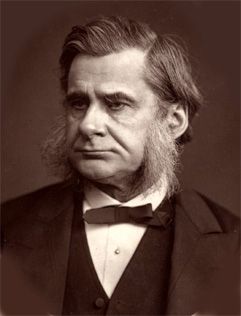
Although William Paley’s Natural Theology (1802) represented a tradition of thinking about the natural world that was supplanted by Darwin’s revolution, Darwin himself expressed admiration for Paley. In his autobiography, for example, he mentions having read Paley’s Natural Theology as well as his View of the Evidences of Christianity and Principles of Moral and Political Philosophy at Cambridge University: “The careful study of these works...was the only part of the academical course which, as I then felt and as I still believe, was of the least use to me in the education of my mind.” Writing to John Lubbock on November 22, 1859—two days before the publication of the Origin of Species—he confided, “I do not think I hardly ever admired a book more than Paley’s Natural Theology: I could almost formerly have said it by heart.—”
Darwin’s appreciation of Paley is tolerably famous. But what about that of his bulldog, Thomas Henry Huxley (above)? I was skimming through a collection of Henry Fairfield Osborn’s essays, Evolution and Religion in Education (1926), recently. A paleontologist by training, who described and named Tyrannosaurus rex, Osborn (1857–1935) was nevertheless characterized by a biographer as “a first-rate science administrator and a third-rate scientist.” It was at the American Museum of Natural History that he performed the former function, initially as the first curator of the Department of Vertebrate Paleontology and then as the president of the Board of Trustees from 1908 to 1933, making him a de facto spokesperson for science in the United States, offering such popularizations and defenses as he deemed necessary.
In “Evolution and Daily Living” (originally published in 1924), a passage about Huxley and Paley caught my eye. According to Osborn, “Huxley once told me that Paley’s argument for the direct handiwork of the Creator was so logically, so ingeniously and convincingly written that he always kept it at his bedside for last reading at night.” Of course, Huxley might have told Osborn that in a letter, but the choice of verb suggests a face-to-face communication, which in turn suggests that the conversation occurred in the winter of 1879–1880, when Osborn was studying comparative anatomy with Huxley in London. Huxley would have been fifty-four years old then: not the callow youth that Darwin was when Paley impressed him so, but a mature scientist ensconced in the burgeoning scientific establishment of his day. Quite a contrast!
Natural Theology was not new to the middle-aged Huxley, of course. According to a report published in Nature about his Rede Lecture (“The Origin of the Existing Forms of Animal Life: Construction or Evolution?”) delivered in 1883 at Cambridge University, Huxley quoted a passage from Natural Theology, without identifying the source, and then disclosed that the words he quoted “were more than eighty years old, and they were contained in the 23rd chapter of a book which was very much talked about, but, he was afraid, very little read, namely, the ‘Natural Theology’ of Archdeacon Paley.” The report added, “When he was a boy that book was a very great favourite of his, partly for its own merits, and partly because it was one of the few books he was allowed to read on Sundays. He found it much more entertaining than most of the books included in that category.”
Neither in his Rede lecture nor in his essay “On the Reception of the ‘Origin of Species’” (published in volume 2 of The Life and Letters of Charles Darwin [1887]) is Huxley invoking Paley just for auld lang syne, though: there’s a clear agenda. In the latter, Huxley is explicitly addressing the objection to Darwin’s views that “they abolish Teleology, and eviscerate the argument from design.” His answer is that it is only “all the commoner and coarser forms of Teleology” that are imperiled, but “a wider teleology … is not touched by the doctrine of Evolution.” It is open to the teleologist, Huxley suggests, to defy the atheist to “disprove that this primordial molecular arrangement [“of which all the phenomena of the universe are the consequences”: today he might have said the Big Bang] was not intended to evolve the phenomena of the universe.”
It is here that Paley is invoked. Huxley writes, “The acute champion of Teleology, Paley, saw no difficulty in admitting that the ‘production of things’ may be the result of trains of mechanical dispositions fixed beforehand by intelligent appointment and kept in action by a power at the centre, that is to say, he proleptically [i.e., in advance] accepted the modern doctrine of Evolution; and his successors might do well to follow their leader, or at any rate to attend to his weighty reasonings, before rushing into an antagonism which has no reasonable foundation.” That rather obscure and complicated sentence—which lacks a crucial pair of quotation marks to boot—raises a few questions. How did Paley provide a way to avoid the abolition of teleology by Darwin’s views? And did he really accept evolution in advance? Answers will be offered in part 2 and part 3.

